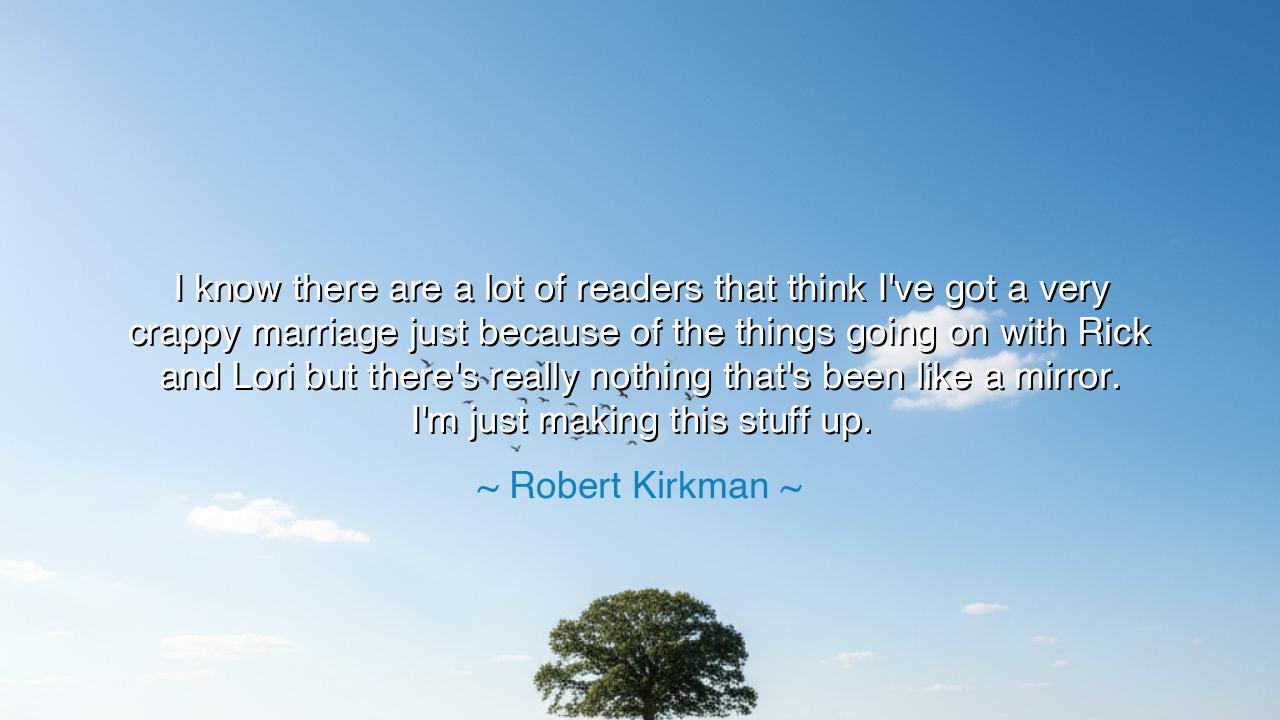
I know there are a lot of readers that think I've got a very
I know there are a lot of readers that think I've got a very crappy marriage just because of the things going on with Rick and Lori but there's really nothing that's been like a mirror. I'm just making this stuff up.






In the boundless world of storytelling, there is often a fine line between fiction and reality, especially when it comes to the portrayal of relationships. Robert Kirkman, the creator of the beloved series The Walking Dead, offers us an insight into this delicate balance with his words: “I know there are a lot of readers that think I've got a very crappy marriage just because of the things going on with Rick and Lori, but there's really nothing that's been like a mirror. I'm just making this stuff up.” Through this statement, Kirkman speaks to the essence of fictional creation—that the struggles and turmoil depicted in his characters' relationships are not reflections of his own life, but the product of his imagination. His message, though rooted in the world of storytelling, extends a timeless truth: that art is not always a mirror to the creator’s personal experiences, but a vehicle for exploring universal themes.
The ancients understood this dichotomy deeply, as they often wove fictional narratives that both reflected and transcended their own lives. Homer, in the great epics of the Iliad and the Odyssey, explored the themes of heroism, love, and betrayal, yet his personal life remains largely unknown. Achilles, in the Iliad, struggles with his sense of honor and his relationship with Agamemnon, a narrative that transcends the personal lives of the Greeks and speaks to the larger questions of society and leadership. The ancients did not necessarily write to expose their own lives but to offer insight into the human condition—to illuminate the complexities of relationships, whether in times of peace or war. Much like Kirkman, Homer used his imagination to craft stories that transcended his own life, offering lessons that resonate across time.
Similarly, the philosopher Plato believed that stories, particularly those told in myths, were a way to uncover deeper truths about humanity. In his famous work, The Republic, Plato discusses the role of the poet and storyteller, asserting that these figures possess the ability to reflect on the ideals of justice and truth, even though their work is not bound by the strictures of personal experience. Kirkman, in his own way, follows this ancient tradition. Through the fictional struggles of Rick and Lori, he is able to explore moral dilemmas, love, and loyalty, without it being tied directly to his personal experiences. The crappy marriage that many of his readers perceive is not a reflection of Kirkman’s own life, but a narrative tool designed to spark thought and reflection about the complexities of human relationships.
Consider the real-life story of King Lear, the tragic Shakespearean figure whose decisions about loyalty, love, and inheritance tear his family apart. While Shakespeare’s own personal life is often difficult to parse, Lear’s turbulent relationships with his daughters offer a poignant exploration of human folly. This narrative, though born from Shakespeare's imagination, taps into universal themes of betrayal, power, and redemption—themes that would have resonated deeply with the audiences of his time and continue to do so today. Kirkman’s depiction of troubled relationships in The Walking Dead serves a similar purpose. It explores the impact of decision-making, the complexity of human emotion, and the toll that conflict and loss can take on the bonds between people. Just as Shakespeare did not necessarily base King Lear on his own family, Kirkman does not use the Lori-Rick dynamic as a reflection of his personal life but as a means of exploring deeper human truths.
The lesson that Kirkman’s words impart is one of understanding and perspective. Art, in all its forms, is often about the exploration of ideas, not about the creator’s personal experience. Writers, artists, and philosophers have always used fiction as a mirror to explore the human experience, but they are not necessarily laying bare their own lives. This distinction is important, for it reminds us that art—whether it be a novel, a film, or a philosophical treatise—can reflect universal truths without being bound by the personal or the autobiographical. Kirkman's statement is a call to recognize that stories, even those that resonate deeply with us, are often tools for introspection, not reflections of the creator’s own private world.
In our own lives, let us remember the power of fiction and art to reveal truths that extend beyond the personal. Whether through storytelling, theater, or literature, we are often able to understand the human experience in ways that go beyond the limits of our own lives. Let us not judge the creator’s work based solely on their personal circumstances but instead appreciate the universal lessons they offer. In doing so, we come to understand that art is not only a reflection of self but a portal to greater truths about the world and the relationships that bind us.
Lastly, let us also recognize the wisdom of Kirkman’s reflection when it comes to the fragility of relationships. While the marriage between Rick and Lori may seem strained or flawed within the world of The Walking Dead, it speaks to larger themes of commitment, betrayal, and personal responsibility. In our own relationships, we must understand that complexity and imperfection are part of the human experience. We are all, in our own ways, characters in the grand narrative of life, each struggling with love, loyalty, and the impact of our choices. Let us then embrace the wisdom of fiction—not as a mirror to our own personal lives but as a tool to help us navigate the complexity of our relationships with others.






AAdministratorAdministrator
Welcome, honored guests. Please leave a comment, we will respond soon